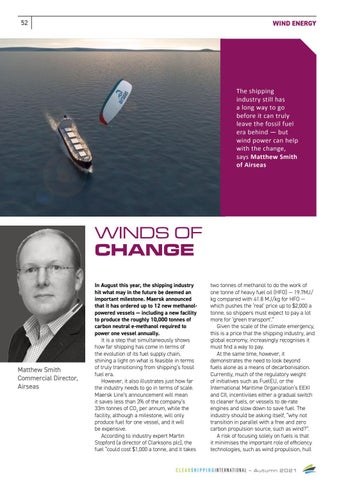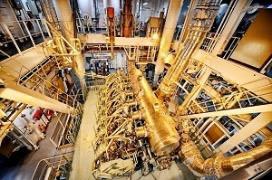52
WIND ENERGY
The shipping industry still has a long way to go before it can truly leave the fossil fuel era behind — but wind power can help with the change, says Matthew Smith of Airseas
WINDS OF CHANGE
Matthew Smith Commercial Director, Airseas
In August this year, the shipping industry hit what may in the future be deemed an important milestone. Maersk announced that it has ordered up to 12 new methanolpowered vessels — including a new facility to produce the roughly 10,000 tonnes of carbon neutral e-methanol required to power one vessel annually. It is a step that simultaneously shows how far shipping has come in terms of the evolution of its fuel supply chain, shining a light on what is feasible in terms of truly transitioning from shipping’s fossil fuel era. However, it also illustrates just how far the industry needs to go in terms of scale. Maersk Line’s announcement will mean it saves less than 3% of the company’s 33m tonnes of CO2 per annum, while the facility, although a milestone, will only produce fuel for one vessel, and it will be expensive. According to industry expert Martin Stopford (a director of Clarksons plc), the fuel “could cost $1,000 a tonne, and it takes
two tonnes of methanol to do the work of one tonne of heavy fuel oil (HFO) — 19.7MJ/ kg compared with 41.8 MJ/kg for HFO — which pushes the ‘real’ price up to $2,000 a tonne, so shippers must expect to pay a lot more for ‘green transport’.” Given the scale of the climate emergency, this is a price that the shipping industry, and global economy, increasingly recognises it must find a way to pay. At the same time, however, it demonstrates the need to look beyond fuels alone as a means of decarbonisation. Currently, much of the regulatory weight of initiatives such as FuelEU, or the International Maritime Organization’s EEXI and CII, incentivises either a gradual switch to cleaner fuels, or vessels to de-rate engines and slow down to save fuel. The industry should be asking itself, “why not transition in parallel with a free and zero carbon propulsion source, such as wind?”. A risk of focusing solely on fuels is that it minimises the important role of efficiency technologies, such as wind propulsion, hull
C L E A N S H I P P I N G INTERNATIONAL – Autumn 2021

















